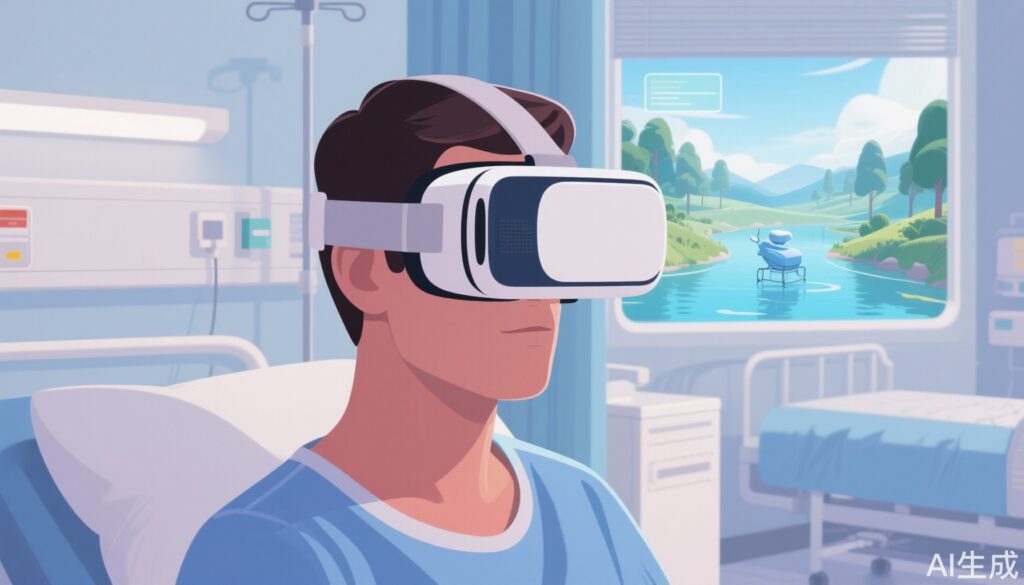Highlights
- Immersive VR reduces overall preoperative anxiety significantly in older adults undergoing first-time cardiac surgery.
- Systematic review and meta-analysis of 35 RCTs confirm VR’s anxiolytic efficacy across elective surgeries, with moderate-to-strong effects particularly in pediatric patients.
- VR distraction approaches yield superior anxiety reduction compared to exposure-based VR techniques.
- Further research is needed to optimize VR integration in perioperative practice, assess impacts on anxiolytic drug use, and enhance patient-centered outcomes.
Background
Preoperative anxiety is a frequent and overlooked stressor for patients awaiting elective surgery, including major procedures such as cardiac surgery. Elevated anxiety can adversely affect physiological parameters and postoperative recovery, increasing the demand for pharmacologic anxiolytics which carry their own risks. Virtual reality (VR) technology offers a novel nonpharmacologic option to alleviate anxiety by immersing patients in controlled sensory environments that distract or desensitize them prior to surgery.
Key Content
Chronological Development of Evidence in Cardiac Surgery Patients
Initial investigations into VR for anxiety reduction in adults undergoing first-time sternotomy for cardiac surgery began with a pilot randomized controlled trial (RCT) conducted from 2017 to 2019 on 20 patients. Using an immersive VR game “Bear Blast,” this study demonstrated significant reductions in self-reported anxiety components such as feeling tense, strained, and upset compared with a tablet-based control group, which showed no change (Mayo Clin Proc. 2020 Jun;95(6):1148-1157) [PMID: 32498771].
Building on these preliminary findings, a larger RCT at Mayo Clinic investigated 100 adult cardiac surgery patients from 2022 to 2022 to clarify VR’s anxiolytic efficacy compared to a tablet-based intervention. Physiological monitoring supplemented self-report measures using the State-Trait Anxiety Inventory (STAI). VR users experienced a statistically significant mean reduction of 2.9 points in the state anxiety score with improvements spanning seven of twenty anxiety features; by contrast, the tablet group showed a non-significant 2.0 point decrease with fewer features improved. Both interventions modestly lowered pulse rate. Despite VR yielding greater anxiety reductions, differences between groups were not statistically significant for the primary endpoint (Mayo Clin Proc. 2025 Feb;100(2):220-234) [PMID: 39755969].
VR Intervention Characteristics and Meta-Analytic Evidence Across Elective Surgeries
A comprehensive systematic review and meta-analysis (29 RCTs, n=3341 patients) encompassing diverse elective surgeries with anesthesia synthesized quantitative evidence up to early 2025. Compared to usual care, VR interventions significantly lowered preoperative anxiety (standardized mean difference [SMD] 0.65; 95% CI 0.37-0.92; P<.001).
Subgroup analyses revealed that VR effects were more pronounced in pediatric populations (SMD 0.77) than adults (SMD 0.58), highlighting developmental and psychological factors influencing responsiveness. Among VR modalities, the distraction approach—engaging patients in immersive games or calming experiences—outperformed exposure strategies designed to simulate surgical scenarios (distraction SMD 0.73 vs exposure SMD 0.61).
The review captured varied VR devices, formats, and durations but emphasized that immersive, engaging content of sufficient length (commonly 10-30 minutes) optimizes anxiolytic outcomes.
Safety and Physiological Effects
Both cardiac surgery trials noted slight reduction in pulse rate post-VR or tablet interventions, reflecting relaxation responses with no significant differences between modalities. No adverse events related to VR use were reported, supporting VR’s safety profile as a perioperative anxiety management tool.
Expert Commentary
The accumulating evidence positions VR as a promising adjunct to conventional preoperative care, especially in high-anxiety settings such as cardiac surgery and pediatric anesthesia. The nonpharmacologic nature reduces reliance on sedatives, potentially lowering side effects such as respiratory depression. Physiological monitoring corroborating subjective anxiety reductions strengthens the translational relevance.
In the cardiac surgery RCT, the lack of statistically significant group differences may relate to sample size, heterogeneity in individual anxiety phenotypes, or modest tablet effects. Features improved only by VR suggest unique therapeutic mechanisms beyond generic distraction, potentially involving immersive sensory modulation and emotional engagement.
Despite promising outcomes, current data are heterogeneous regarding VR implementation frameworks—device types, session timing, and content customization—which remain critical variables influencing efficacy. Personalized VR content aligning with patient preferences, cultural context, and surgical type may enhance relevance.
Clinicians should weigh VR integration feasibility, cost, and staff training, balancing benefits against practical barriers in routine surgical workflows. Higher-quality, large-scale RCTs with long-term follow-up assessing medication use reduction, postoperative recovery metrics, and patient satisfaction are warranted to establish guideline-level recommendations.
Conclusion
Virtual reality-based interventions constitute an effective, safe, and innovative strategy to mitigate preoperative anxiety, particularly in adult cardiac surgery and pediatric elective surgery populations. Meta-analytic findings confirm moderate anxiolytic effects favoring distraction approaches delivered via immersive VR technology. Progress in defining optimal intervention parameters and embedding VR in standard perioperative protocols should be prioritized to enhance patient experiences and outcomes.
References
- Subramaniam T, Dearani JA, Stulak JM, Lahr B, Lee A, Miller JD. A Randomized, Controlled Trial of In-Hospital Use of Virtual Reality to Reduce Preoperative Anxiety Prior to Cardiac Surgery. Mayo Clin Proc. 2025 Feb;100(2):220-234. doi:10.1016/j.mayocp.2024.08.027. PMID: 39755969.
- Li H, Chiu PL, Efendi D, Huang H, Ko KY, Wong CL. Effects of Virtual Reality-Based Interventions on Preoperative Anxiety in Patients Undergoing Elective Surgery With Anesthesia: Systematic Review and Meta-Analysis. J Med Internet Res. 2025 Apr 30;27:e55291. doi:10.2196/55291. PMID: 40305092; PMCID: PMC12079079.
- Subramaniam T, et al. The Use of Virtual Reality to Reduce Preoperative Anxiety in First-Time Sternotomy Patients: A Randomized Controlled Pilot Trial. Mayo Clin Proc. 2020 Jun;95(6):1148-1157. doi:10.1016/j.mayocp.2020.02.032. PMID: 32498771.



